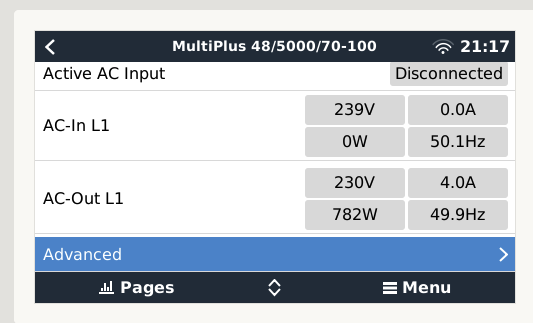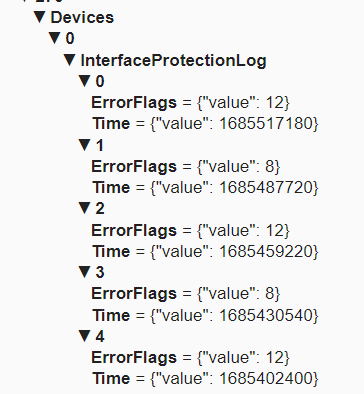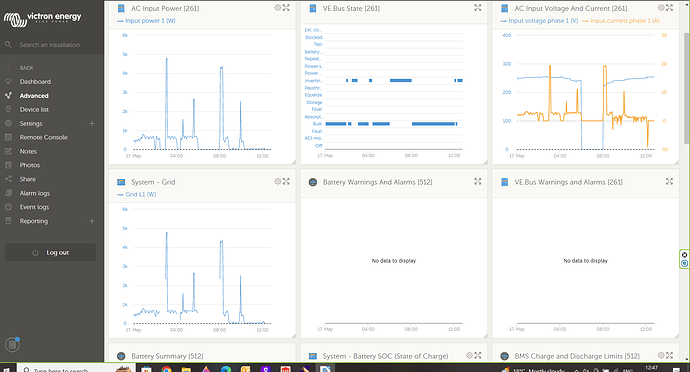Hi All - can anyone please shed some light on this, my Multiplus is inverting as if the grid is not available, but the grid is available; it is not loadshedding and our power is not off. This happened last night as well. Please see attached screenshot.
??
Switch on the AC IN voltage graph and then check that it is within limits.
See High Grid Voltage
and Grid voltage too high?
Hi Louis - it’s changing between 253 to 255 Volts, with the odd 260 Volt (and now it’s load shedding, so can’t check anymore). From the posts you quoted above, I gather that the voltage is too high as per the Grid code, which is why the Multi disconnects the grid, and the Municipality will have to sort this out. Well, cant’ see that happening here in Tshwane… ![]()
![]() Thanks for the reply.
Thanks for the reply.
The supply voltage is actually a contractual, legally binding obligation, not an oops-a-daisy guideline. Push the issue.
I have seen a minimum of 3 grid disconnects from my Tripconnect today.
Set it to 250v, I’m done waiting for Victron to have to step in … ok, Victron is now the abso-bloody-last-resort.
I’ve noticed my Multi I 5KVA’s relays click over a couple of times in the last few days - but only for a second or two.
I downloaded the data (attached) of the last time it happened earlier this afternoon - but can’t really see that it is going too high (in either Home Assistant or VRM). Not sure what’s going on?
Also in City of Tswhane.
20230528-1354_to_20230528-1453.xlsx (46.1 KB)
Mine does it when I turn on my coffee machine. Doesnt like the rotary pump.
It seems to doing it more and more.
I can’t however see in the VRM logs that the voltage is too high - it seems to hover between 230 - 240v. Not sure VRM has enough resolution to see - any other way I can check?
I do notice that there’s more in the last hour or so (evening peak?)
EDIT: I don’t see any correlation between my own usage.
Can you check the grid frequency?
Caught it as it happened:

Frequency 50.1 Hz according to the GX is fine?
239V is fine?
Me taking a stab in the dark, but I heard there’s a way for municipalities to inject a signal in the AC to control geysers etc. Not sure how it works, but could it be that the municipality is trying that out and the Multi doesn’t like it?
Not sure, and also weird that they started doing it ~5 days ago. I’ve never had this issue before in the 2+ years I’ve had the system.
Also would expect more people in Tshwane to complain, but a colleague in Centurion has no such issue.
Very unlikely, it’s a standard and has been in use for a very long time.
Had a look at a colleague’s VRM, who lives a couple of streets from me (generally the same neighbourhood). No indication of problems on his… makes me worry that it might be my inverter.
Indeed. I know of one country where there was an issue, but they were using something non-standard (compared to the rest of the world). I think it was Poland but I’m unsure.
@ebendl There is another somewhat hidden value you can look at. I assume you are at least somewhat familiar with rooting a GX and looking on dbus? On the vebus service (the Multi), there is a few logs of the reasons it disconnected, stored on the path Devices/0/InterfaceProtectionLog/n/ErrorFlags, where n is a number. The last 4 is remembered.
Yours shows the value 8. It is a bitmask, and that value is 1000 in binary. The 4th bit means “LowVoltage”. It disconnected because there was a very brief dip in the voltage.
Roughly,
1 = RoCoF, 2 = HIgh frequency, 4 = Low frequency, 8 = Low voltage, 16 = High voltage, etc.
Interestingly the previous event has the value 12, which means low voltage and frequency.
Edit: And RoCoF is Rate of Change of Frequency. Second derivative in other words. If it accelerates or decelerates too quickly, it is seen as a problem.
Using MQTT Explorer I can see how the V and Hz causes these errors during the loadshedding cycle.

On a linux system, or anything where the date commands accepts the -d option (is that GNU-specific?), you can also easily translate that timestamp.
date -d '1970-01-01 1685517180 seconds'
Wed 31 May 2023 07:13:00 SAST
@plonkster - is the bitmask documented somewhere in public github?
This is a really nice way of diagnosing why the inverter decides to disconnect, thank you. Using ‘dbus-spy’ on the venus itself you can also access the values under the ‘com.victronenergy.vebus.xxx’ key. For example, on my system:


